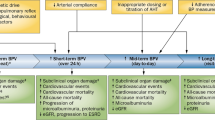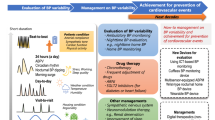Abstract
A morning blood pressure surge (MBPS) may be either a mechanism for, or a marker of, increased cardiovascular events. This study has examined factors which may influence the morning surge: age, gender, metabolic factors, sympathetic function, blood pressure and arterial stiffness. Four measures of the MBPS were examined—sleep-trough surge, pre-awake surge, rate of blood pressure rise and a Power function. Subjects underwent ambulatory blood pressure monitoring, glucose tolerance test, central pulse wave velocity, sympathetic autonomic function tests (mental stress and sustained handgrip). MBPS was associated with age, hypertension, blood pressure variability and serum lipids. After adjustment for age and waist circumference, all four measures of MBPS remained positively associated with low-density lipoprotein (LDL) cholesterol. The novel finding of a significant relationship between measures of MBPS and LDL-cholesterol is an intriguing link between two major cardiovascular risk factors.
This is a preview of subscription content, access via your institution
Access options
Subscribe to this journal
Receive 12 digital issues and online access to articles
$119.00 per year
only $9.92 per issue
Buy this article
- Purchase on Springer Link
- Instant access to full article PDF
Prices may be subject to local taxes which are calculated during checkout

Similar content being viewed by others

References
Willich SN, Lowel H, Lewis M, Arntz R, Baur R, Winther K et al. Association of wake time and the onset of myocardial infarction. Triggers and mechanisms of myocardial infarction (TRIMM) pilot study. TRIMM Study Group. Circulation 1991; 84: VI62–V167.
Willich SN, Levy D, Rocco MB, Tofler GH, Stone PH, Muller JE . Circadian variation in the incidence of sudden cardiac death in the Framingham Heart Study population. Am J Cardiol 1987; 60: 801–806.
Kario K . Morning surge in blood pressure and cardiovascular risk: evidence and perspectives. Hypertension 2010; 56: 765–773.
Head GA, Lukoshkova EV . Understanding the morning rise in blood pressure. Clin Exp Pharmacol Physiol 2008; 35: 516–521.
Kario K, Pickering TG, Umeda Y, Hoshide S, Hoshide Y, Morinari M et al. Morning surge in blood pressure as a predictor of silent and clinical cerebrovascular disease in elderly hypertensives: a prospective study. Circulation 2003; 107: 1401–1406.
Li Y, Thijs L, Hansen TW, Kikuya M, Boggia J, Richart T et al. Prognostic value of the morning blood pressure surge in 5645 subjects from 8 populations. Hypertension 2010; 55: 1040–1048.
Amici A, Cicconetti P, Sagrafoli C, Baratta A, Passador P, Pecc T et al. Exaggerated morning blood pressure surge and cardiovascular events. A 5-year longitudinal study in normotensive and well-controlled hypertensive elderly. Arch Gerontol Geriatr 2009; 49: e105–e109.
Metoki H, Ohkubo T, Kikuya M, Asayama K, Obara T, Hashimoto J et al. Prognostic significance for stroke of a morning pressor surge and a nocturnal blood pressure decline: the Ohasama study. Hypertension 2006; 47: 149–154.
Marfella R, Siniscalchi M, Portoghese M, Di Filippo C, Ferraraccio F, Schiattarella C et al. Morning blood pressure surge as a destabilizing factor of atherosclerotic plaque: role of ubiquitin-proteasome activity. Hypertension 2007; 49: 784–791.
Head GA, Reid CM, Lukoshkova EV . Nonsymmetrical double logistic analysis of ambulatory blood pressure recordings. J Appl Physiol 2005; 98: 1511–1518.
Head GA, Chatzivlastou K, Lukoshkova EV, Jennings GL, Reid CMA . Novel measure of the power of the morning blood pressure surge from ambulatory blood pressure recordings. Am J Hypertens 2010; 23: 1074–1081.
Reid C, Head G, Lukoshkova E, Shiel L, Owen A, Wing L . The Power of the morning blood pressure surge and its relation to long-term survival in the 2nd Australian National Blood Pressure Study (Anbp2) [abstract]. J Hypertens 2010; 28: e15.
Panza JA, Epstein SE, Quyyumi AA . Circadian variation in vascular tone and its relation to alpha-sympathetic vasoconstrictor activity. N Engl J Med 1991; 325: 986–990.
Brandenberger G, Follenius M, Goichot B, Saini J, Spiegel K, Ehrhart J et al. Twenty-four-hour profiles of plasma renin activity in relation to the sleep-wake cycle. J Hypertens 1994; 12: 277–283.
Alberti KG, Eckel RH, Grundy SM, Zimmet PZ, Cleeman JI, Donato KA et al. Harmonizing the metabolic syndrome: a joint interim statement of the International Diabetes Federation Task Force on Epidemiology and Prevention; National Heart, Lung, and Blood Institute; American Heart Association; World Heart Federation; International Atherosclerosis Society; and International Association for the Study of Obesity. Circulation 2009; 120: 1640–1645.
WHO. Definition, Diagnosis and Classification of Diabetes Mellitus and Its Complications; Part 1: Diagnosis and Classification of Diabetes Mellitus. In World Health Organisation. Department of Noncommunicable Disease Surveillance: Geneva, Switzerland, 1999.
Bilo G, Giglio A, Styczkiewicz K, Caldara G, Maronati A, Kawecka-Jaszcz K et al. A new method for assessing 24 h blood pressure variability after excluding the contribution of nocturnal blood pressure fall. J Hypertens 2007; 25: 2058–2066.
Mena L, Pintos S, Queipo NV, Aizpurua JA, Maestre G, Sulbaran T . A reliable index for the prognostic significance of blood pressure variability. J Hypertens 2005; 23: 505–511.
Cicero AF, D'Addato S, Veronesi M, Rosticci M, Santi F, Dormi A et al Brisighella Heart Study Group. Relationship between blood pressure, cholesterolemia and serum apolipoprotein B in a large population sample: the Brisighella Heart Study. J Hypertens 2012; 30: 492–496.
Altman DG . Royston P. The cost of dichotomizing continuous variables. BMJ 2006; 332: 1080.
Neutel JM, Schumacher H, Gosse P, Lacourciere Y, Williams B . Magnitude of the early morning blood pressure surge in untreated hypertensive patients: a pooled analysis. Int J Clin Pract 2008; 62: 1654–1663.
Lee DH, Ihm SH, Youn HJ, Choi YS, Park CS, Park CS et al. Age is an independent risk factor for the early morning blood pressure surge in patients never-treated for hypertension. Korean Circ J 2009; 39: 322–327.
Shimizu M, Ishikawa J, Eguchi K, Hoshide S, Shimada K, Kario K . Association of an abnormal blood glucose level and morning blood pressure surge in elderly subjects with hypertension. Am J Hypertens 2009; 22: 611–616.
Hering D, Kucharska W, Kara T, Somers VK, Narkiewicz K . Resting sympathetic outflow does not predict the morning blood pressure surge in hypertension. J Hypertens 2011; 29: 2381–2386.
Chatzivlastou K, Lukoshkova EV, Schlaich M, Lambert GW, Lambert EA, Head GA . Does the reactivity of the sympathetic nervous system contribute to the morning surge in blood pressure [abstract]. Hypertension 2008; 53: 1104.
Yano Y, Kario K . Possible difference in the sympathetic activation on extreme dippers with or without exaggerated morning surge. Hypertension 2009; 53: e1.
Polonia J, Amado P, Barbosa L, Nazare J, Silva JA, Bertoquini S et al. Morning rise, morning surge and daytime variability of blood pressure and cardiovascular target organ damage. A cross-sectional study in 743 subjects. Rev Port Cardiol 2005; 24: 65–78.
Polonia J, Carvalho N, Barbosa L, Silva JA . Blood pressure on arising, morning blood pressure surge and blood pressure variability in white coat hypertensives and in matched normotensives and sustained hypertensives. Rev Port Cardiol 2006; 25: 693–704.
Acknowledgements
Catherine Martin is receiving a scholarship from Monash University.
Author information
Authors and Affiliations
Corresponding author
Ethics declarations
Competing interests
The authors declare no conflict of interest.
Rights and permissions
About this article
Cite this article
Martin, C., Cameron, J., Head, G. et al. The morning blood pressure surge is related to serum cholesterol. J Hum Hypertens 27, 315–320 (2013). https://doi.org/10.1038/jhh.2012.44
Received:
Revised:
Accepted:
Published:
Issue Date:
DOI: https://doi.org/10.1038/jhh.2012.44


